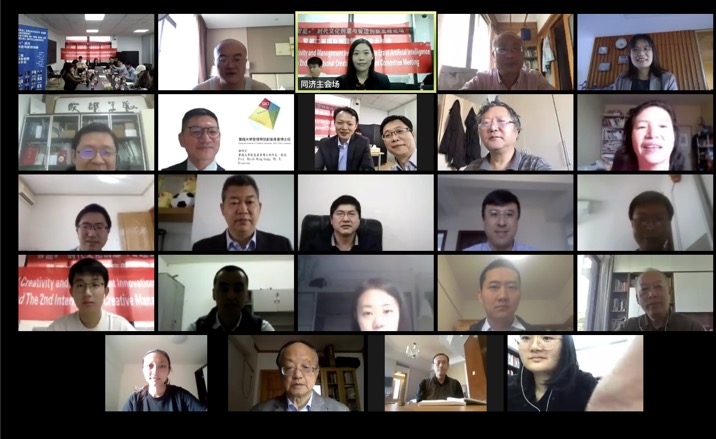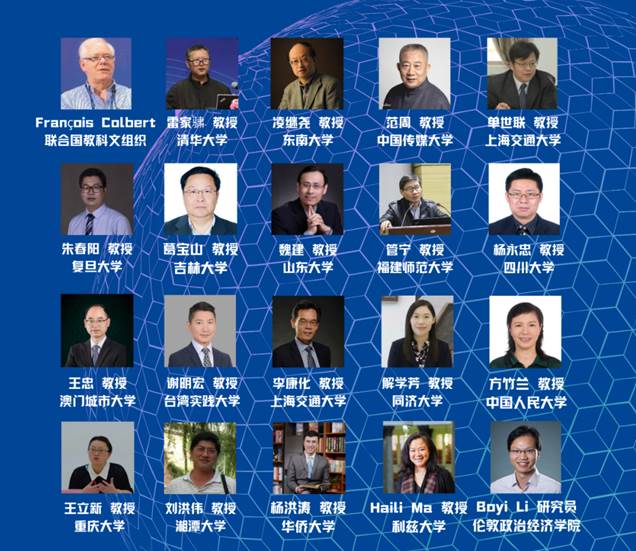On November 1, the Summit Forum on Cultural Creativity and Management Innovation in the Era of “Intelligence+” and the Second Annual Meeting of the International Creative Management Committee (ICMC) was held online. The meeting was organized by the Department of Art and Cultural Industry, School of Humanities, Tongji University. Prof. XIE Xuefang of the Tongji’s School of Humanities and Deputy Director of the ICMC served as the meeting’s academic convener and Executive Chairman. Prof. YANG Yongzhong of Sichuan University served as Chairman.
At the meeting, 19 experts in the field of cultural and creative management from UNESCO’s Culture Administration Committee, HEC Montréal (Canada), University of Leeds (UK), London School of Economics and Political Science (LSE), Monash University (Australia), Shih Chien University (Taiwan, China), City University of Macao, and Tongji, Tsinghua, Fudan, Shanghai Jiao Tong, Sichuan Universities, along with other international organizations and universities at home and abroad delivered keynote speeches. More than 60 scholars discussed the development strategy and transformation of cultural and creative industries in the “Intelligent +” era. More than 2,300 online viewers attended the meeting via ZOOM Meetings and the Bilibili streaming media platform.

Participants at the virtual meeting
At the meeting, fruitful achievements were reached in the following four aspects:
First, the meeting explored the new cultural landscapes in the intelligent era. Experts reached a consensus: the arrival of the “Intelligent+” era not only boosts the innovation of the cultural industry in promoting the presentation of new industries and new modes, but it also brings about changes in innovation subjects and creative management which is of great significance to the future management system and development path of the cultural industry. Experts pointed out that artificial intelligence (AI) and the cultural industry will be integrated and developed further in the future. The cultural industry will use AI, 5G, blockchain, and other advantageous technical resources, dig deep into culture and creativity with ingenuity, and move towards networked, data-driven, experiential, and intelligent forms under the collaborative innovation of technology, content, and modes. Experts also warned of new ethical issues that could arise as a result of AI;
Second, an international cooperative mindset for discussion and research has been formed. Although the experts come from different cities around the world, the themes of concern are common. They all focus on the common problems of the global cultural and creative industries, and explore the future direction of creativity, intelligence, and human civilization;
Third, as a forum for editors-in-chief in the field of cultural and creative industries, the meeting has attracted the editors-in-chief from many publishing houses, including International Journal of Arts Management, Journal of Shandong University, Fujian Tribune, Journalistic University, Creative Management Review, China Cultural Industry Review and Report on China’s Urban Culture, to monitor the pulse of the cutting-edge research of cultural and creative management;
Fourth, the meeting held a cutting-edge teaching materials themed forum of cultural and creative management in the “Intelligent+” era. Ten experts and scholars from universities and publishing houses exchanged opinions and determined ten advanced textbooks to be published soon.
Prof. Colbert, Chairman of the UNESCO’s Culture Administration Committee, delivered his keynote speech on the theme: Consumer Experience of Artistic Equipment. He pointed out that art products are essentially experiential products, and consumers are not passive but participate jointly in producing and creating art.
LI Boyi, a research fellow at the LSE, examined the potential of the Belt and Road Initiative (BRI). He noted it is a new movement of globalization aimed at reshaping contemporary transnational space regimes’ capabilities. Drawing on the case of China’s promotion of urban creative economy in developing countries within the framework of the BRI, he explored whether the Initiative could have a substantial impact in developing countries. At the same time, he put forward a research agenda in global policy and international development: is there an approach that does not take realism in international relations as a framework but understands institutional capacity-building in contemporary transnational space in the real cultural globalization?
Prof. FAN Zhou of the Communication University of China delivered his speech: Artificial Intelligence Promotes New Change in Cultural and Creative Industry. He introduced China’s AI industry's current development status and the opportunities it faces and analyzed the role of AI in promoting the cultural industry and its transformation in cultural products, cultural communication, cultural scenes, and cultural consumption. He pointed out that it is still in the weak AI stage, AI and cultural industries will be further integrated in the near future.
Prof. SHAN Shilian of the Shanghai Jiao Tong University put forward the concept of New Homo Sapiens Era, focusing on the relationship between AI and human beings. He pointed out that cultural discussions should focus on “cultural technology” and respond to the “dehumanization” of technology in the face of digital and intelligent technologies. Science and technology have pushed the intelligent age society to a new ethical boundary, and intelligent technology has gradually separated human beings from “humanity.” When human beings and humanity become commodities, and “artificial humans” appear in large quantities, the “natural human” may disappear, and the “post-human” may be born. While technology is a controllable external force, we still need to be vigilant about the possible emergence of “new Homo sapiens” and the threats they pose.
Prof. XIE Xuefang of the Tongji University focused on innovating the modern cultural industry in the era of “5G Plus AI (5G+AI).” She proposed taking advantage of the new AI, 5G, blockchain, and other new technological innovation advantages in the intelligent era to deeply explore and display culture and creativity, forming an integration style between new forms of business and a new mode, characterized by digitalization, online access, networking, experience, and intelligence. Besides, Prof. XIE put forward three major trends in the development of the cultural industry: 1) mobile internet empowerment is a new prospect in the 5G era; 2) 5G+AI innovation brings the cultural industry to advance towards networking, data, and experience; 3) and 5G+AI integration is the coordination of technological innovation, content innovation, and mode innovation.

It is reported the ICMC was established jointly in 2019 by more than 40 domestic and foreign colleges and universities, including Sichuan University, Tsinghua University, Peking University, Renmin University of China, Shanghai Jiao Tong University, Tongji University, Jilin University, Nankai University, Chongqing University, East China University of Political Science and Law, LSE, and other colleges and universities. The next annual meeting will be held at Chongqing University.